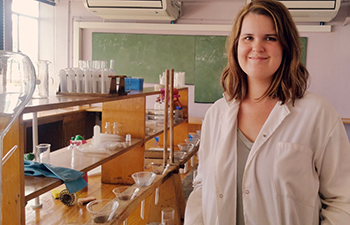Latest News Archive
Please select Category, Year, and then Month to display items
14 June 2024
|
Story Anthony Mthembu
|
Photo Suplied
 Jeremiah Hlahla, a UFS student completing his PhD in Botany at the University of Debrecen as part of an exchange initiative funded by the Erasmus+ Mobility Programme.
Jeremiah Hlahla, a UFS student completing his PhD in Botany at the University of Debrecen as part of an exchange initiative funded by the Erasmus+ Mobility Programme.
As part of an exchange initiative facilitated by the Erasmus+ Mobility Programme, Jeremiah Hlahla, a student at the University of the Free State (UFS), is nearing the completion of his PhD studies at the University of Debrecen in Hungary. Hlahla’s journey, which began in February 2024 and is set to conclude in July 2024, has been a remarkable learning opportunity. “As a first time-traveller to Europe, I have thoroughly enjoyed engaging with people from different countries and cultures,” he said.
The benefits of international collaboration
Hlahla is currently pursuing a PhD in Botany, focusing on plant stress physiology. “My current PhD project investigates the physiological, biochemical and morphological responses of vegetable-type soybean, or edamame, to combined drought and heat stress,’’ he explained. He considers the University of Debrecen the ideal institution to complete his research due to its extensive expertise and resources in similar projects. He noted that his colleagues at Debrecen conduct significant work on plant protection against biotic and abiotic stresses, including salt and drought stress, as well as proteins and amino acids in barley and other legumes.
Given the vast knowledge available on similar projects, Hlahla has found substantial engagement with his work at the University of Debrecen. “Upon arrival, I delivered an introductory lecture presenting my UFS project on the synergistic effects of combined drought and heat stress on the physiology and biochemistry of edamame. It was an engaging session as everyone could relate to my work and asked many questions,’’ he said.
Insights gained from the exchange
Hlahla has also gained valuable lessons that will assist him in his research career, including biotechnology and physiology tools. “I learned how to prepare samples and use high-performance liquid chromatography (HPLC) and reversed-phase ultra-high-performance liquid chromatography (UHPLC) to quantify proteins and amino acids,’’ he said. These techniques are beneficial not only for his current work but will also support future soybean research.
As his experience at the University of Debrecen nears its end, Hlahla reflects on the collaborations and friendships he has formed, which stand out as a significant highlight.
Postgraduate student to conduct research on maize quality at Michigan State University
2017-03-27

Schae-Lee Olckers, master’s student in the
Department of Microbial Biochemical and
Food Biotechnology.
Photo: Supplied
Schae-Lee Olckers, a master’s student in the Department of Microbial Biochemical and Food Biotechnology at the University of the Free State (UFS), will be travelling to the US in a few weeks’ time. For the next two years she will be doing research at the Michigan State University (MSU) at its Department of Food Science, working on wheat quality and its baking properties.
Increase the nutritional value of maize
The title of her master’s research project is: “The influence of low and optimal nitrogen conditions on the nutritional value of quality protein maize”. She is focusing on the influence of environmental conditions on the nutritional value of maize.
New hybrids of maize production developed
Olckers said: “I chose to start my research on this specific topic in my honours year because maize is the main staple crop in South Africa, as well as in the rest of Africa. Therefore, micronutrient malnutrition is a major concern for developing countries as well as for poor people who rely on it as a major food source. I found it interesting that these breeding programmes that are being developed for new hybrids of maize for production are focusing on increasing the nutritional value of maize and can therefore help eliminate micronutrient malnutrition in some populations of poor communities,” she said.
Prof Perry Ng will be her research supervisor. He is an affiliated professor at UFS in the division of Plant Breeding. “I am very excited about the opportunity to travel and to gain experience working with a well-known cereal scientist. The work he does is also closely associated with my research,” said Olckers.
Her supervisors at UFS are Profs Garry Osthoff and Maryke Labuschagne from the Departments of Microbial Biochemical and Food Biotechnology and Plant Sciences respectively.